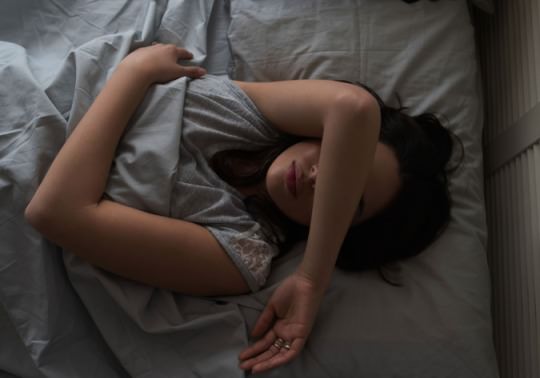Menstrual Insomnia: Sleep Better During Your Period
It is estimated, according to a report by the National Sleep Foundation, three out of 10 women have sleeping problems during the period.
The menstrual insomnia or sleeping problems are a symptom that also accompanies the premenstrual syndrome. In this case, according to medical data, it is estimated that insomnia affects 23% of women in the days prior to the period. What to do if the discomfort of the period steals your sleep?
Poor sleep not only makes us feel more tired on the following day, but possibly more irritable and less concentrated. Insomnia has physical effects – including appetite, headache – and emotional mood swings, apathy….
Table of Contents
What is The Cause of Menstrual Insomnia?
Menstrual insomnia refers to difficulty sleeping that some individuals experience during certain phases of their menstrual cycle. The primary causes are linked to hormonal fluctuations and their effects on the body and brain. Key factors include:
Hormonal Changes
The primary cause of menstrual insomnia is the change in estrogen and progesterone levels. In the luteal phase (the second half of the menstrual cycle, after ovulation), progesterone levels rise.
Progesterone has a sedative effect, which can promote sleep. However, just before your period starts, both progesterone and estrogen levels drop sharply, which can disrupt your normal sleep patterns and make it harder to fall asleep or stay asleep.
PMS and Mood Swings
Premenstrual Syndrome (PMS) often includes mood swings, anxiety, and irritability, which can make it difficult to relax and fall asleep.
The emotional instability associated with PMS can cause insomnia or lead to restless nights, where you wake up multiple times throughout the night.
Read Also: How To Get Pregnant Fast After Myomectomy
Body Temperature Fluctuations
Progesterone raises body temperature after ovulation, and this rise can make it harder to fall asleep. An increase in core body temperature is associated with alertness, while a decrease is necessary for initiating sleep.
Cramps and Physical Discomfort
Menstrual cramps (dysmenorrhea) and other physical symptoms such as bloating, back pain, and headaches can cause discomfort, making it difficult to fall asleep. The pain may also wake you up in the middle of the night, further disrupting your sleep.
Disrupted Melatonin Levels
Melatonin is a hormone that regulates the sleep-wake cycle. The hormonal changes during your menstrual cycle can affect the body’s melatonin production, which may reduce its ability to regulate your sleep pattern effectively.
Anxiety and Stress
Some women experience increased stress and anxiety during their period, which may be due to hormonal imbalances or emotional sensitivity. Stress can exacerbate insomnia by causing a racing mind, making it harder to relax enough to sleep.
Blood Sugar Fluctuations
Hormonal changes during menstruation can also cause blood sugar levels to fluctuate, which might lead to irritability or waking up in the middle of the night due to hunger or blood sugar imbalances. This further disrupts your ability to sleep peacefully.
Tips for Better Sleep During Period
Implementing certain habits and strategies can help you improve sleep quality and ensure you wake up refreshed, even on the most challenging nights of your cycle. Here are some comprehensive tips to guide you.
Maintain a Regular Sleep Schedule
A consistent sleep schedule is crucial, especially during menstruation when your body is more sensitive to changes. Going to bed and waking up at the same time every day regulates your circadian rhythm, allowing you to fall asleep more easily and achieve deeper sleep cycles.
Aim for at least 7-9 hours of sleep per night, and try not to deviate too much from your regular sleep routine, even on weekends.
Create a Relaxing Bedtime Routine
A calming bedtime routine can prepare your body for rest, helping to alleviate the anxiety or discomfort often associated with menstruation. Some relaxing activities include:
- Taking a warm bath with Epsom salts to soothe cramps and relax muscles.
- Practicing deep breathing exercises or meditation to ease tension.
- Reading a book or listening to soothing music.
By winding down with these activities, your body will signal that it’s time for sleep, helping you fall asleep faster and stay asleep longer.
Opt for Light Meals and Stay Hydrated
Digestive discomfort during your period, such as bloating or cramping, can make it harder to sleep. Eating light, nutritious meals throughout the day can prevent these symptoms.
Avoid foods that are high in salt, spicy foods, and caffeine, which can worsen bloating and cause dehydration, both of which negatively impact sleep.
Instead, opt for whole grains, fruits, vegetables, and foods rich in magnesium (such as bananas, leafy greens, and almonds), which have muscle-relaxing properties.
Staying hydrated is equally important, as drinking enough water will prevent dehydration – related fatigue and cramping.
Use Heat Therapy for Cramps
Menstrual cramps are a common cause of discomfort during sleep. Applying heat to your lower abdomen can alleviate cramps and help your body relax.
A heating pad or hot water bottle placed on your stomach can significantly reduce pain and ease you into sleep. If you’re prone to waking up with cramps during the night, consider using a self-heating patch that provides continuous warmth for hours.
Adjust Your Sleep Environment for Maximum Comfort
Your bedroom environment plays a major role in how well you sleep, especially during your period. Make sure your room is set up to promote the best possible rest:
- Keep the room cool, as body temperature tends to fluctuate during menstruation, which can make you feel hotter than usual. A cool room, around 60-67°F (15-19°C), is ideal for most people.
- Use comfortable bedding and choose pajamas made from breathable fabrics like cotton to prevent overheating.
- Block out excess light with blackout curtains or a sleep mask and reduce noise by using earplugs or a white noise machine.
Manage Mood Swings with Relaxation Techniques
Hormonal changes during your period can lead to increased irritability, anxiety, or mood swings, all of which can interfere with sleep.
To counteract these emotions, engage in relaxation techniques like yoga, progressive muscle relaxation, or guided imagery before bedtime. These practices help calm your mind, reduce stress, and make it easier to drift off to sleep.
Track Your Menstrual Cycle and Plan Ahead
Knowing when to expect sleep interruptions and make appropriate plans are made possible by being aware of your menstrual cycle.
Use a menstrual cycle tracking app to monitor when your period is due, along with symptoms like insomnia or excessive tiredness. By tracking your cycle, you can plan to implement sleep-friendly habits around the times when you’re most likely to experience difficulties.
If you know that certain days of your cycle lead to poor sleep, prioritize self-care on those days. This might include making time for naps, adjusting your exercise routine, or scheduling a lighter workload.
Exercise Regularly – But Avoid Late Workouts
Regular exercise can improve your overall sleep quality and ease menstrual symptoms. Engaging in activities like walking, swimming, or yoga can help relieve period – related discomforts like cramps and bloating while also promoting better sleep.
However, it’s important to avoid vigorous exercise right before bed, as this can have a stimulating effect and make it harder to fall asleep.
Aim to get your exercise in at least 3-4 hours before bedtime to give your body time to wind down.
Be Mindful of Caffeine and Alcohol Intake
While caffeine can provide a much-needed energy boost during your period, especially if you’re feeling sluggish, it can also interfere with sleep. Limit your caffeine consumption in the afternoon and evening to prevent disruptions to your sleep cycle.
Alcohol, while sometimes perceived as a sedative, actually leads to more fragmented sleep and can exacerbate night sweats or hot flashes, which are more common during menstruation. If possible, avoid alcohol altogether or limit your intake in the evenings.

